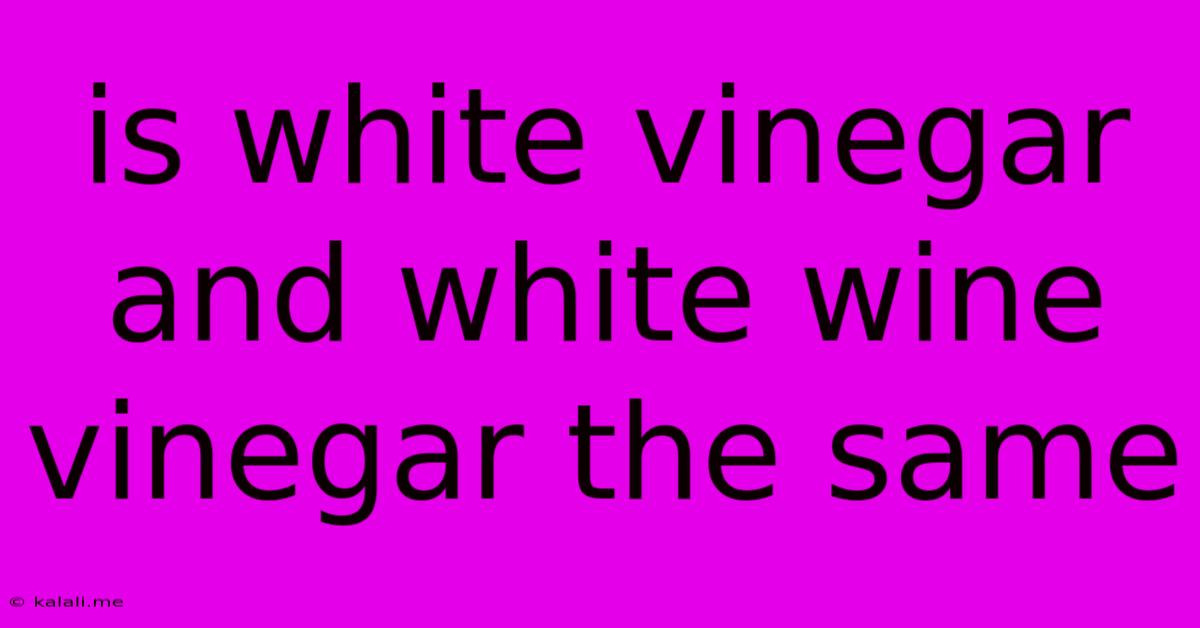Is White Vinegar And White Wine Vinegar The Same
Kalali
May 25, 2025 · 3 min read

Table of Contents
Is White Vinegar and White Wine Vinegar the Same? A Deep Dive into Culinary Cousins
While both white vinegar and white wine vinegar are clear, acidic liquids used in cooking, they are not exactly the same. Understanding their subtle differences can significantly impact your culinary creations. This article explores the distinctions between these two vinegars, covering their production, flavor profiles, and best culinary applications.
What Makes Them Different?
The key difference lies in their source material and fermentation process.
-
White Vinegar: This versatile vinegar has a broad range of sources. It can be made from grains (like barley or rice), potatoes, or even sugarcane. The fermentation process typically involves two steps: first, the source material is fermented into alcohol, then the alcohol is further fermented into acetic acid, the main component responsible for vinegar's sour taste. This often results in a sharper, more pungent taste compared to white wine vinegar.
-
White Wine Vinegar: As the name suggests, this vinegar is derived specifically from white wine. After the winemaking process, the remaining wine is fermented into acetic acid, creating a vinegar with a more delicate, nuanced flavor profile. The type of white wine used influences the final taste. For instance, a vinegar made from Sauvignon Blanc will have different characteristics than one made from Chardonnay.
Flavor Profiles: A Side-by-Side Comparison
While both are acidic, their flavor profiles differ significantly.
-
White Vinegar: Generally possesses a sharper, more aggressive acidity, often described as tart or pungent. Depending on the source material, it can also have subtle hints of sweetness or graininess. Think of the sharp bite in a classic vinaigrette.
-
White Wine Vinegar: Offers a softer, more complex acidity. It often showcases subtle fruity notes and a hint of sweetness, making it more refined and versatile for delicate dishes. Its flavor is more nuanced and less harsh than white vinegar.
Culinary Applications: When to Use Which
Choosing the right vinegar depends entirely on the desired taste.
-
White Vinegar: Ideal for applications where a strong, sharp acidity is needed. It's excellent for:
- Pickling: Its assertive taste cuts through the sweetness of pickled vegetables.
- Cleaning: Its acidity makes it effective as a household cleaner.
- Marinades: It can tenderize meats and add a punchy flavor.
- Salad Dressings (for bolder flavors): Great for vinaigrettes with robust ingredients.
-
White Wine Vinegar: Its milder flavor is better suited for dishes where a more delicate acidity is needed, complementing rather than overpowering other flavors. Consider using it for:
- Salad Dressings (for lighter flavors): Perfect for vinaigrettes with delicate greens and herbs.
- Sauces: Adds a sophisticated tang to creamy sauces or reductions.
- Marinade for fish and poultry: Enhances the flavor without overpowering the delicate meat.
- French dressings: Its nuanced acidity complements the herbs and oil.
In Conclusion:
While both white vinegar and white wine vinegar share some similarities, their origins, production methods, and resulting flavor profiles are distinct. Understanding these differences allows you to choose the perfect vinegar to elevate your culinary creations and achieve the desired balance of flavors in your dishes. Whether you need a sharp punch or a delicate tang, selecting the correct vinegar significantly impacts the final outcome.
Latest Posts
Latest Posts
-
How To Use Embeded Keys With Nginx
May 27, 2025
-
Revelation Verse Aobut The People Being Blind And Cant Hear
May 27, 2025
-
How Long To Smoke 20 Lb Turkey
May 27, 2025
-
Washing Machine Making Noise When Agitating
May 27, 2025
-
How Long Is Tuna Good In The Refrigerator
May 27, 2025
Related Post
Thank you for visiting our website which covers about Is White Vinegar And White Wine Vinegar The Same . We hope the information provided has been useful to you. Feel free to contact us if you have any questions or need further assistance. See you next time and don't miss to bookmark.